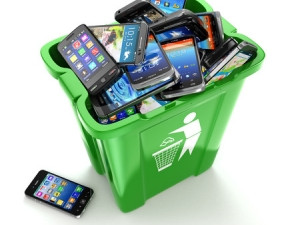
Mobile phone manufacturers are releasing too many new models, instead of ensuring smartphones can be easily repaired if damaged.
This is according to a survey commissioned by Greenpeace East Asia, across six countries. In all countries surveyed, consumers said mobile phone manufacturers should be responsible for providing people with the means to recycle their phones, while four in five surveyed said that it was important that a new smartphone can be easily repaired if damaged.
"The humble smartphone puts enormous strain on our environment from the moment they are produced - often with hazardous chemicals, to the moment they are disposed of in huge e-waste sites.
"Over half of respondents across the countries surveyed agree that manufacturers are releasing too many new models, many designed to only last a few years. In fact, most users actually want their phones to be more easily dismantled, repaired and recycled," explains Chih An Lee, global IT campaigner at Greenpeace East Asia.
Further findings revealed the Chinese (66%) and South Korean respondents (64%) are more likely to have their phones repaired, compared to those in the US (28%) and Germany (23%).
Four in five respondents consider it important that a new smartphone is not produced using hazardous chemicals.
Nearly half of those surveyed, notes the study, believe mobile phone manufacturers should be most responsible for making recycling accessible. This sentiment was strongest in Germany (61%).
Apart from respondents in South Korea, the most common reason for replacing their last phone was the desire for a more up-to-date device.
Greenpeace says if tech brands want to lead us into the future, they need to move towards closed-loop production and embrace the circular economy: something that can be good for their profits, for people and for the planet.
Greenpeace East Asia conducted the survey as part of its True Innovation campaign, which challenges the technology sector to embrace innovation to protect our environment and our future.
"We believe true innovation means gadgets are designed to last, to be repaired and recycled. It is time for tech leaders to rethink the way they make our electronics so that they are as innovative for our planet as they are for our lives," Lee points out.
Mobile phones are some of the most frequently replaced of all small electronics products. A United Nations University report in 2014 showed up to 3 million metric tons of e-waste is generated from small IT products, such as mobile phones and personal computers.
"By 2017 the volume of end-of-life TVs, phones, computers, monitors, e-toys and other products will be enough to fill a 15 000-mile line of 40-tonne lorries. In Europe, Germany discards the most e-waste in total, but Norway and Liechtenstein throw away more per person. Britain is now the world's seventh most prolific producer, discarding 1.37 million tonnes, or about 21kg per person.
"Millions of mobile phones, laptops, tablets, toys, digital cameras and other electronic devices bought this Christmas are destined to create a flood of dangerous 'e-waste' that is being dumped illegally in developing countries," warns the UN report.
Share